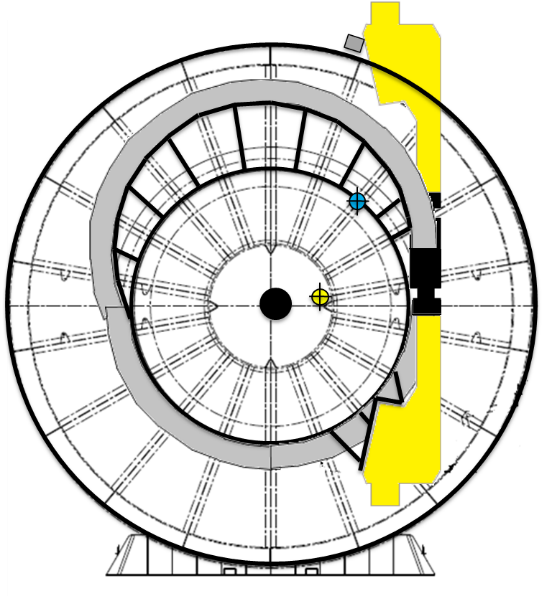Uncontrolled rotation of 9.6m reel
A member has reported a near-miss incident which a large hydraulic reel started rotating in an uncontrolled way. The incident occurred during onshore preparatory works for a vessel mobilisation. Two 9.6m diameter reels laden with jumpers and pullheads had to be lifted and transported from the storage area to the quayside using a ‘Jumbo Reel Carrier’ (JRC). The first reel was successfully transported to the quayside with its transport cradles attached as normal. It was then decided to transfer the second reel to the quayside without its cradles as they could land the reel onto the cradles from the first reel once it had been lifted onto the vessel. As the second reel was being lifted, it started rotating in an uncontrolled manner, until a pullhead touched the ground and was damaged.



Our member’s investigation identified the following:
- The immediate cause of the incident was found to be the action of lifting the reels without the cradles (weight circa 3Te each) caused the CoG (Centre of Gravity) to be above the pivot points. This combined with the fact that the reel was already unbalanced owing to the position of pullheads and the snail caused the reel to overcome the friction at lift points and rotate;
- The criticality of the position of the CoG of the loaded reel was not recognised;
- There was a lack of awareness that the JRC was not designed to lift and transport reels that are significantly off-balance;
- Only once the hubs were engaged and the reel lifted was any form of locking mechanism active;
- Procedures and risk assessments for the task were generic and did not account for variations (e.g. lengths/weights of jumper, position of pullheads, orientation of reel and snail); . In the absence of detailed instructions for the operation and of task specific procedures, the decision to move the reel without cradles was not subject to any consultation or approval; . Various reels have been moved at site using the JRC since it was delivered to the base three months prior to the incident; . Although the operators had moved balanced reels without cradles during training, it was the first reel to be lifted by the JRC without cradles at this base.
Our member concluded by noting that although the JRC was specifically designed to lift and transport reels, there was a failure to:
- Consider the limitations of the JRC with regard to lifting reels containing additional components;
- Recognise that lifting without cradles was a change;
- Ensure method statements, risk assessments and procedures adequately consider the actual task and loads involved.
Whilst this incident involved a JRC, the points highlighted in the conclusion are equally applicable to everyday operations. When planning a task, ensure limitations of equipment are known, supporting information is suitably specific and change is managed where it occurs.
Members may wish to refer to the following incident (key words: uncontrolled, winch, rotation):
Safety Event
Published: 31 October 2014
Download: IMCA SF 17/14
IMCA Safety Flashes
Submit a Report
IMCA Safety Flashes summarise key safety matters and incidents, allowing lessons to be more easily learnt for the benefit of all. The effectiveness of the IMCA Safety Flash system depends on Members sharing information and so avoiding repeat incidents. Please consider adding [email protected] to your internal distribution list for safety alerts or manually submitting information on incidents you consider may be relevant. All information is anonymised or sanitised, as appropriate.
IMCA’s store terms and conditions (https://www.imca-int.com/legal-notices/terms/) apply to all downloads from IMCA’s website, including this document.
IMCA makes every effort to ensure the accuracy and reliability of the data contained in the documents it publishes, but IMCA shall not be liable for any guidance and/or recommendation and/or statement herein contained. The information contained in this document does not fulfil or replace any individual’s or Member's legal, regulatory or other duties or obligations in respect of their operations. Individuals and Members remain solely responsible for the safe, lawful and proper conduct of their operations.
